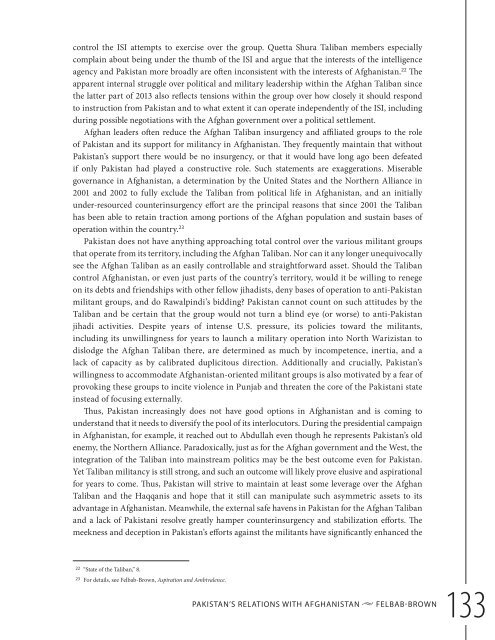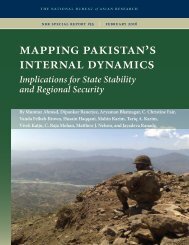pakistan’s
SR55_Mapping_Pakistan_February2016
SR55_Mapping_Pakistan_February2016
You also want an ePaper? Increase the reach of your titles
YUMPU automatically turns print PDFs into web optimized ePapers that Google loves.
control the ISI attempts to exercise over the group. Quetta Shura Taliban members especially<br />
complain about being under the thumb of the ISI and argue that the interests of the intelligence<br />
agency and Pakistan more broadly are oten inconsistent with the interests of Afghanistan. 22 The<br />
apparent internal struggle over political and military leadership within the Afghan Taliban since<br />
the latter part of 2013 also reflects tensions within the group over how closely it should respond<br />
to instruction from Pakistan and to what extent it can operate independently of the ISI, including<br />
during possible negotiations with the Afghan government over a political settlement.<br />
Afghan leaders oten reduce the Afghan Taliban insurgency and affiliated groups to the role<br />
of Pakistan and its support for militancy in Afghanistan. They frequently maintain that without<br />
Pakistan’s support there would be no insurgency, or that it would have long ago been defeated<br />
if only Pakistan had played a constructive role. Such statements are exaggerations. Miserable<br />
governance in Afghanistan, a determination by the United States and the Northern Alliance in<br />
2001 and 2002 to fully exclude the Taliban from political life in Afghanistan, and an initially<br />
under-resourced counterinsurgency effort are the principal reasons that since 2001 the Taliban<br />
has been able to retain traction among portions of the Afghan population and sustain bases of<br />
operation within the country. 23<br />
Pakistan does not have anything approaching total control over the various militant groups<br />
that operate from its territory, including the Afghan Taliban. Nor can it any longer unequivocally<br />
see the Afghan Taliban as an easily controllable and straightforward asset. Should the Taliban<br />
control Afghanistan, or even just parts of the country’s territory, would it be willing to renege<br />
on its debts and friendships with other fellow jihadists, deny bases of operation to anti-Pakistan<br />
militant groups, and do Rawalpindi’s bidding? Pakistan cannot count on such attitudes by the<br />
Taliban and be certain that the group would not turn a blind eye (or worse) to anti-Pakistan<br />
jihadi activities. Despite years of intense U.S. pressure, its policies toward the militants,<br />
including its unwillingness for years to launch a military operation into North Warizistan to<br />
dislodge the Afghan Taliban there, are determined as much by incompetence, inertia, and a<br />
lack of capacity as by calibrated duplicitous direction. Additionally and crucially, Pakistan’s<br />
willingness to accommodate Afghanistan-oriented militant groups is also motivated by a fear of<br />
provoking these groups to incite violence in Punjab and threaten the core of the Pakistani state<br />
instead of focusing externally.<br />
Thus, Pakistan increasingly does not have good options in Afghanistan and is coming to<br />
understand that it needs to diversify the pool of its interlocutors. During the presidential campaign<br />
in Afghanistan, for example, it reached out to Abdullah even though he represents Pakistan’s old<br />
enemy, the Northern Alliance. Paradoxically, just as for the Afghan government and the West, the<br />
integration of the Taliban into mainstream politics may be the best outcome even for Pakistan.<br />
Yet Taliban militancy is still strong, and such an outcome will likely prove elusive and aspirational<br />
for years to come. Thus, Pakistan will strive to maintain at least some leverage over the Afghan<br />
Taliban and the Haqqanis and hope that it still can manipulate such asymmetric assets to its<br />
advantage in Afghanistan. Meanwhile, the external safe havens in Pakistan for the Afghan Taliban<br />
and a lack of Pakistani resolve greatly hamper counterinsurgency and stabilization efforts. The<br />
meekness and deception in Pakistan’s efforts against the militants have significantly enhanced the<br />
22 “State of the Taliban,” 8.<br />
23 For details, see Felbab-Brown, Aspiration and Ambivalence.<br />
PAKISTAN’S RELATIONS WITH AFGHANISTAN u FELBAB-BROWN<br />
133



